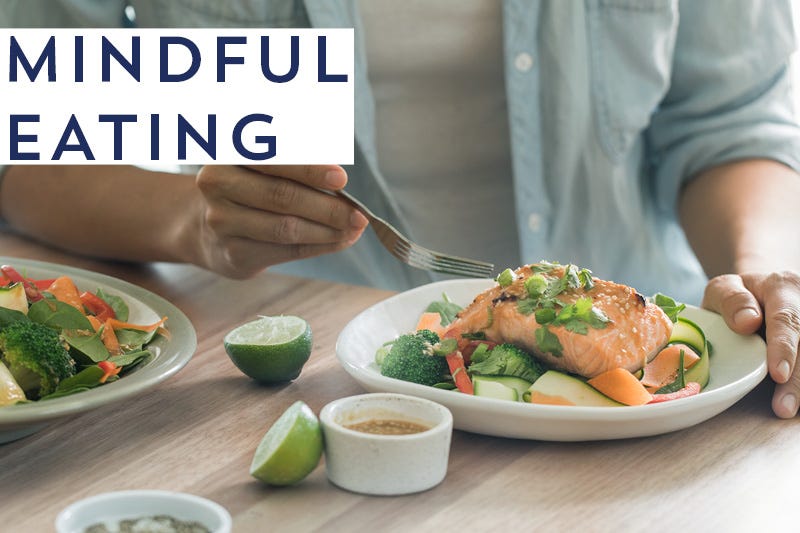
The term mindfulness finds its’ roots in Buddhism, where complete awareness of yourself and your surroundings is required to reach enlightenment. When we speak of mindfulness in the following, it is referring to how we are aware and conscious of ourselves, our habits and the environment around us.
Thinking of the last thing you consumed; how easily can you recall it? Was it your breakfast? A snack? A cup of coffee or tea? How easy is it to remember in detail? If you’re struggling to remember, it may be time look at how mindful you are of what you’re putting in your body.
For many of us, Monday-Friday is riddled with routine, which means, focusing on what we are consuming isn’t always a priority. Taking a smoothie with you in the car on the way to work, eating remnants of the kids’ school lunches, late night dinners in front of the T.V. — all can be patterns of mindless eating. When we are trying to lose weight, mindless eating can have a large effect on our overall result, without us even realising it.
If we have set a caloric target to help us achieve our weight loss goals, and we continue to consume food subconsciously, this is going to be detrimental to our results. Let’s say we have a biscuit at morning tea each day out of habit and perhaps not because we truly desire the biscuit. Of course, there is nothing wrong with having a biscuit now and then but rather than eating it because it’s the last biscuit in the cookie jar, we should be able to enjoy it because someone baked it for us, or because it’s our favourite flavour. Being mindful of the food we eat will allow us to recognise the food choices we are making and be aware of the joy we get out of different foods.
Boredom can be one of the biggest culprits of mindless eating, consider the number of times today or this week that you’ve stared into the fridge or pantry with no real purpose. If weight loss is our goal, we need to stay alert to our food habits and try to recognise when we are bored versus when we are hungry. Try to avoid bored eating by fixing or creating a new habit. For example, every time you go to stand and stare into the fridge, drink a glass of water instead or walk around the house 3 times to get your steps up. That will hopefully help to prevent you consuming food you aren’t longing for. Not only that, but if we can make sure we are actually hungry before we start snacking, the food will be so much more satisfying when it is filling our empty tummies.
Mindless eating can sometimes lead us to feelings of resentment over what we ate when weren’t really thinking. If we do feel guilt towards something we’ve eaten, we should ask ourselves why. Was it because it didn’t actually taste good, making it feel like a waste of calories? Did it make you feel icky, bloated or sick? Or was it because you weren’t actually hungry to begin with? Understanding our physical and mental reactions to different foods will help us to make better choices in the future.
If you think you are struggling with your relationship with food, physically or mentally, why not try a food diary? Not so much a traditional food diary to track what you’re eating, but more to track how you are feeling about what you’re eating. Try for one week, or even one day, to write down what you ate and how you felt after eating it — Happy? Bloated? Guilty? Satisfied? These notes will give you some valuable insight into your food habits. You may discover that you always feel bloated after eating dairy and may decide, therefore, to cut down on it. Or you may discover you’re being very hard on yourself mentally when it comes to eating certain foods, in which case you need to get down to the root cause of why that is and try to address it. Regardless of what you discover, don’t beat yourself up about your eating. You are here after all, taking positive steps to identify and address what’s going on.
By practicing mindful eating, we are treating our bodies with the respect they deserve. Making sure we are eating when we’re actually hungry, not filling our bodies with junk subconsciously and focusing on our food while we are eating, rather than while watching t.v. or being on our phones. Having this awareness of our food habits and patterns means we can work on ways to improve our relationship with food and how it affects our weight loss.
Click here to return to Fresh Start Blog

